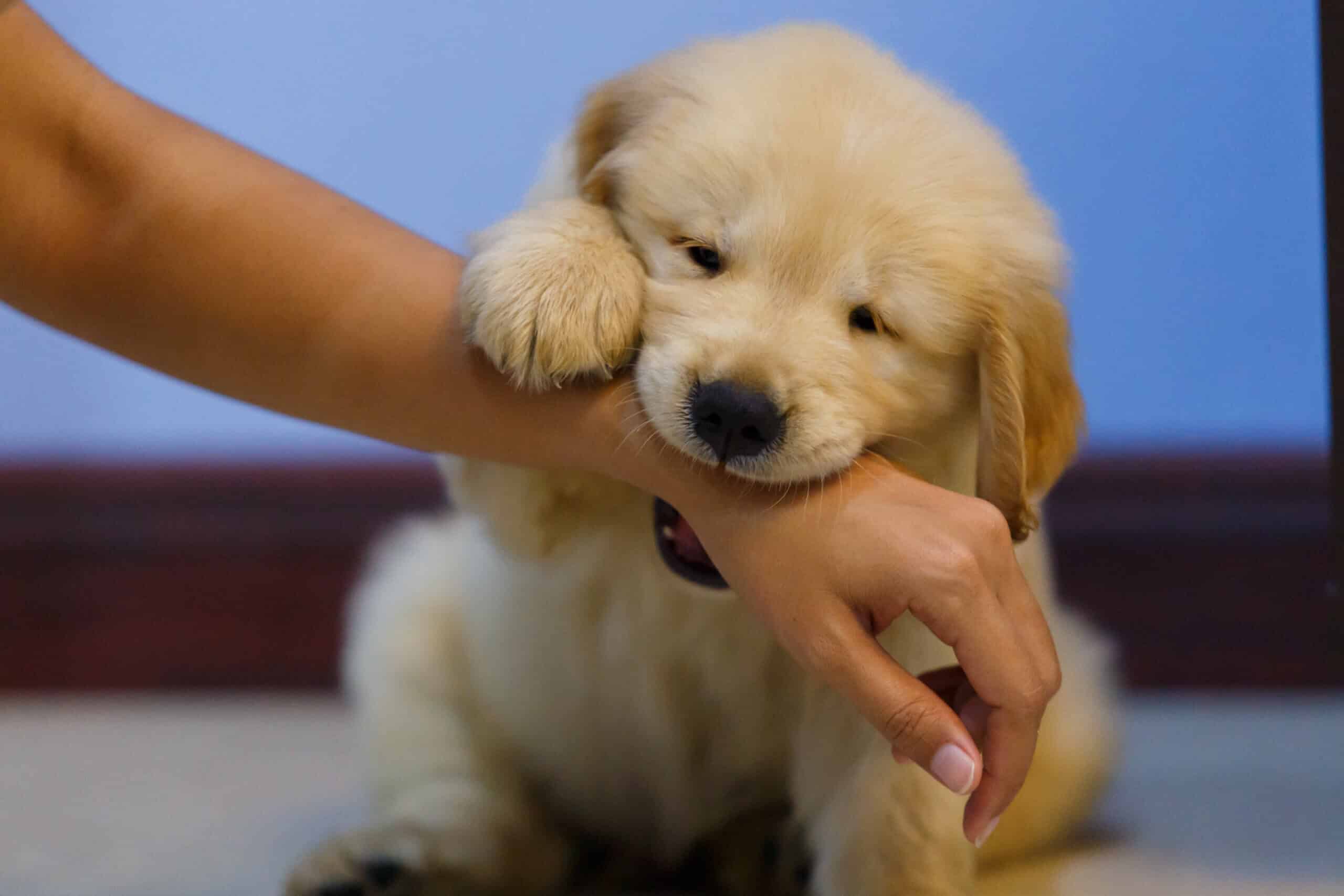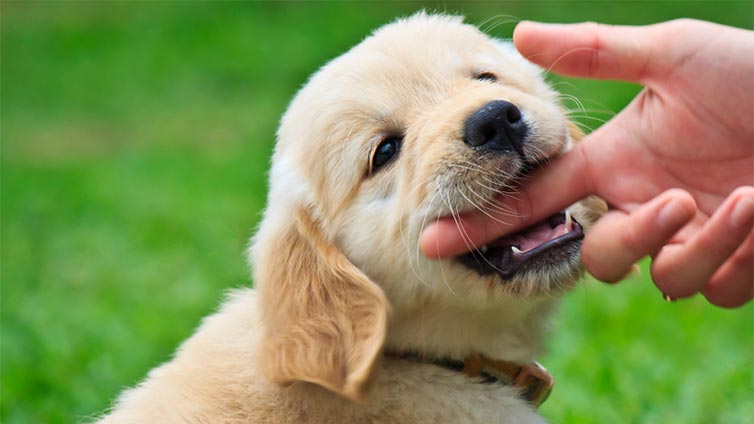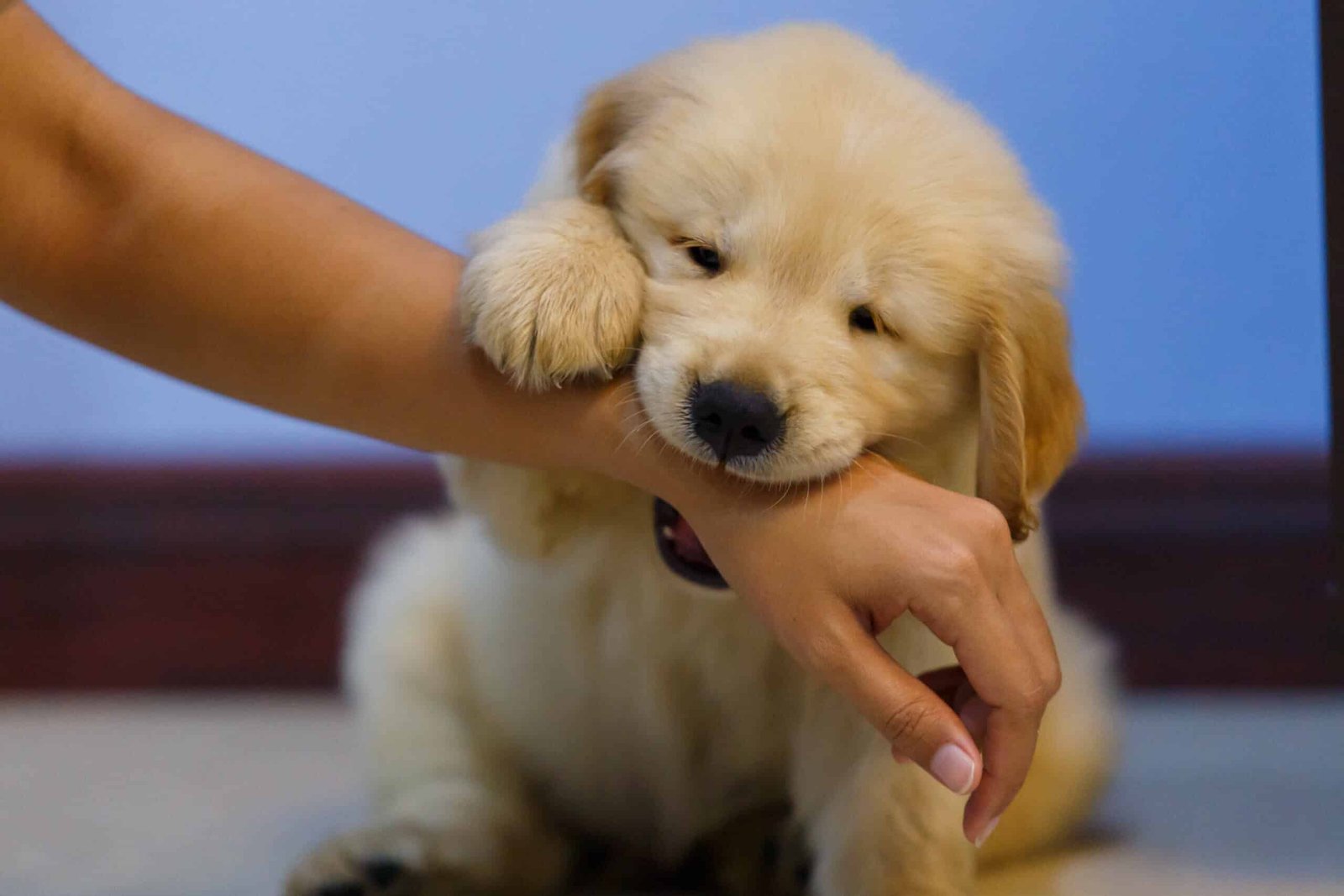When do golden retriever puppies stop biting? If you’re curious about when those sharp little puppy teeth will finally give you a break, you’re in the right place! Golden retriever puppies are undeniably adorable, but their biting behavior can be challenging to handle. But fear not, because in this article, we’ll dive into when you can expect those puppy nibbles to subside.
Golden retriever puppies typically start biting at a young age as a natural part of their development. Their baby teeth are coming in, and they explore the world around them by using their mouths. While it may be cute at first, those playful nips can become quite painful as your fluffy friend grows. So, let’s find out when you can expect this biting behavior to taper off and enjoy more cuddles and less nibbles!
As your golden retriever puppy grows and their adult teeth start to come in, their biting behavior should gradually diminish. However, every puppy is different, and it can take weeks or even months for them to fully stop the biting. So, be patient and consistent with training, and before you know it, those nips will be a thing of the past. Now, let’s delve into the journey of golden retriever puppy teeth and discover when the biting frenzy tends to calm down.

When Do Golden Retriever Puppies Stop Biting?
Golden Retriever puppies are known for their playful and energetic nature. They often use their mouths to explore the world around them, which includes biting. However, as a responsible pet owner, it is important to teach them proper bite inhibition and discourage biting behavior. In this article, we will discuss when Golden Retriever puppies typically stop biting and how you can train them to have gentle jaws.
Stage of Teething
Golden Retriever puppies, like all puppies, go through a stage called teething. This is when their baby teeth start to fall out, and their permanent teeth begin to grow in. Teething usually starts around 3 to 4 months of age and can last up until 7 months. During this stage, puppies may experience discomfort and tend to chew on anything they can find to alleviate the pain. This chewing behavior may extend to biting hands, fingers, and even clothes.
As the teething phase progresses, the puppy’s biting behavior should start to decrease. By around 6 to 7 months of age, most Golden Retriever puppies have their full set of adult teeth, and the urge to bite or chew should significantly diminish. However, it is essential to note that this timeline can vary from one puppy to another based on their individual development.
To help your Golden Retriever puppy navigate the teething stage, provide them with appropriate chew toys and discourage them from biting on inappropriate objects. Regularly check their mouth for any signs of irritation or discomfort, and consult with your veterinarian if you notice any issues.
Training and Socialization
Beyond the teething stage, proper training and socialization play a crucial role in curbing a Golden Retriever puppy’s biting behavior. It is important to start training early and set clear boundaries for what is and isn’t acceptable in terms of biting or mouthing. Consistency and positive reinforcement are key.
Teach your puppy the “leave it” or “drop it” command to discourage biting and redirect their attention to appropriate toys or activities. Gradually introduce them to different people, animals, and environments to help them become well-socialized and less prone to anxiety-driven biting. Training classes, where they can interact with other puppies and learn from experienced trainers, can also be beneficial.
Remember, patience is crucial. Golden Retriever puppies are intelligent and eager to please, but it may take some time for them to fully grasp the concept of gentle play. Stay consistent with your training methods and reward them when they exhibit good behavior. Before long, biting should become a thing of the past.
Supervision and Safety Measures
While your Golden Retriever puppy is still learning proper bite inhibition, it is important to supervise their interactions with family members, especially young children who may not understand the consequences of rough play. Teach children how to interact with the puppy gently and avoid encouraging any biting behaviors.
Additionally, provide your puppy with plenty of physical and mental exercise to help channel their energy and prevent boredom. A tired puppy is less likely to engage in destructive biting behavior. Engage in activities such as daily walks, playtime, and puzzle toys that challenge their intelligence and keep their minds stimulated.
Remember, every puppy is unique, and some may require more time and effort to stop biting than others. Be patient, consistent, and seek guidance from professional dog trainers if necessary. Soon enough, your Golden Retriever puppy will outgrow their biting phase and become a well-behaved adult dog.
Preventing Biting: Tips for Golden Retriever Puppy Owners
As a Golden Retriever puppy owner, there are several additional steps you can take to prevent and address biting behavior. Here are some tips to help you along the way:
1. Provide Appropriate Chew Toys
Golden Retriever puppies have a natural instinct to chew. Offer them a variety of safe and durable chew toys to redirect their biting behavior. Replace any damaged or unsafe toys regularly.
a. Freeze Toys for Teething Relief
Freeze some of the chew toys to provide extra relief to your puppy’s sore gums during the teething phase.
b. Rotate Toys
Rotate the toys you offer to keep your puppy engaged and prevent them from getting bored with the same toys.
2. Use Positive Reinforcement
When your puppy exhibits good behavior and refrains from biting, reward them with praise, treats, or playtime. Positive reinforcement helps reinforce the desired behavior.
a. Ignore Biting
If your puppy bites during playtime, avoid reacting dramatically, as this may inadvertently encourage the behavior. Instead, withdraw attention and briefly stop play. This teaches your puppy that biting leads to a loss of attention.
3. Socialize Your Puppy
Expose your Golden Retriever puppy to various people, animals, and environments from an early age. Proper socialization helps them become confident and less likely to engage in fear-based biting.
a. Puppy Classes
Enroll your puppy in puppy classes where they can interact with other dogs and learn socialization skills from expert trainers.
4. Set Clear Boundaries
Establish clear rules regarding biting and mouthing. Teach your puppy that biting is unacceptable by redirecting their attention to appropriate toys or activities and using commands like “leave it” or “drop it”.
a. Consistency
Consistency is key when setting boundaries. Ensure that everyone in the household follows the same rules to avoid confusion for your puppy.
5. Avoid Harsh Punishment
Avoid using harsh punishment or physical force as it can lead to fear and aggression in your puppy. Positive reinforcement, such as rewards and redirection, is more effective in shaping desired behavior.
a. Time-Outs
If your puppy continues to bite despite your best efforts, calmly put them in a designated time-out space for a short period to teach them that biting results in a cessation of play.
6. Seek Professional Help
If you are struggling to manage your Golden Retriever puppy’s biting behavior, consider seeking help from a professional dog trainer or behaviorist. They can provide personalized guidance and support tailored to your specific situation.
FAQs – Answers to Common Questions About Golden Retriever Puppy Biting
Let’s address some frequently asked questions about Golden Retriever puppy biting:
1. Is it normal for Golden Retriever puppies to bite?
Yes, it is normal for Golden Retriever puppies to bite. They use their mouths to explore the world around them and learn about their environment. However, it is essential to teach them proper bite inhibition and redirect their biting behavior.
2. When do Golden Retriever puppies stop biting?
Golden Retriever puppies typically stop biting as they go through the teething stage and their permanent teeth grow in. This usually occurs between 6 to 7 months of age.
3. How do I train my Golden Retriever puppy to stop biting?
To train your Golden Retriever puppy to stop biting, provide appropriate chew toys, use positive reinforcement, socialize them, set clear boundaries, avoid harsh punishment, and seek professional help if necessary.
4. Why is my Golden Retriever puppy biting so much?
There can be several reasons why your Golden Retriever puppy is biting excessively, including teething, boredom, lack of proper training, or fear. Identifying the underlying cause can help you address the behavior effectively.
5. What should I do if my Golden Retriever puppy bites me?
If your Golden Retriever puppy bites you, immediately withdraw attention, say “ouch” in a high-pitched tone to mimic a puppy’s yelp, and redirect their attention to an appropriate chew toy. Consistency and positive reinforcement are key in teaching them that biting is unacceptable.
6. How long will it take to train my Golden Retriever puppy to stop biting?
The time it takes to train a Golden Retriever puppy to stop biting can vary depending on the individual puppy and their response to training. Consistency, patience, and positive reinforcement can expedite the process.
7. Can biting be a sign of aggression in Golden Retriever puppies?
While biting is normal for Golden Retriever puppies, it can escalate into aggressive behavior if not properly addressed. If you notice signs of aggression, such as growling, snarling, or biting with intensity, seek professional guidance as soon as possible.
8. Will neutering my Golden Retriever puppy reduce biting?
Neutering or spaying your Golden Retriever puppy can help reduce behaviors influenced by hormones, such as roaming and aggression. However, it is not a guaranteed solution for biting-related issues. Training and proper socialization are still necessary.
Remember, every Golden Retriever puppy is unique, and patience, consistency, and positive reinforcement are key in shaping their behavior. With time, effort, and proper training, you can successfully teach your puppy to stop biting and develop gentle play habits.
Key Takeaways: When do Golden Retriever puppies stop biting?
- Golden Retriever puppies typically stop biting around 6 to 8 months of age.
- It’s important to start training and socializing your puppy from a young age to discourage biting behavior.
- Providing appropriate chew toys can help redirect your puppy’s need to bite.
- Consistent and positive reinforcement training methods can help teach your puppy not to bite.
- Patience and consistency are key when dealing with puppy biting behavior.
Frequently Asked Questions
Are you wondering when your golden retriever puppy will stop biting? Check out the frequently asked questions below to learn more about this common puppy behavior.
Why do golden retriever puppies bite?
Golden retriever puppies, like many other breeds, go through a teething phase. This is when puppies start losing their baby teeth and adult teeth begin to grow in. Biting and chewing help relieve their discomfort. Additionally, puppies explore the world with their mouths, so biting is a way for them to interact with their environment.
It’s essential to understand that biting is a natural behavior for puppies, but it is important for them to learn bite inhibition, which is the ability to control the force of their bites. This is where puppy training comes in, teaching them to bite softly or not at all.
When do golden retriever puppies stop biting?
Golden retriever puppies start teething between 3 to 4 months old, and this is typically the time when biting is at its peak. However, with consistent training and socialization, most golden retriever puppies learn bite inhibition and stop biting as aggressively around 5 to 6 months old.
It’s important to note that individual puppies may progress at different rates, so some may stop biting earlier, while others may take a little longer. Consistency, positive reinforcement, and patience are key when teaching puppies to stop biting.
How can I stop my golden retriever puppy from biting?
There are several strategies you can employ to help discourage biting behavior in your golden retriever puppy. Firstly, provide appropriate chew toys to redirect their biting instincts. When your puppy bites, redirect their attention to the toy and praise them when they chew it instead.
Additionally, you can use positive reinforcement training techniques such as reward-based training. When your puppy refrains from biting or bites softly, reward them with treats and praise. This helps them associate good behavior with positive outcomes.
Is biting common during the teething phase?
Yes, biting is very common during the teething phase. As puppies’ adult teeth start to come in, they experience discomfort, and biting helps alleviate this discomfort. It’s important to provide appropriate chew toys for your golden retriever puppy during this phase and encourage them to chew on those instead of your hands or furniture.
If biting becomes too intense or aggressive, interrupt the behavior with a firm “no” and redirect their attention to a chew toy. Consistency is key to helping them learn that biting is not acceptable.
When should I seek professional help for my golden retriever puppy’s biting?
If your golden retriever puppy’s biting behavior is persistent or aggressive, it may be beneficial to seek professional help from a certified dog trainer or behaviorist. They can assess your puppy’s behavior, provide tailored training techniques, and offer guidance on how to address the issue effectively.
Remember, it’s essential to seek professional assistance as soon as possible to prevent biting behavior from becoming a long-term habit that could escalate into a more serious issue.

Do This Every Day To Stop Golden Retriever Puppy Biting
Summary
Golden Retriever puppies usually stop biting around 4 to 6 months old. It’s a normal part of their development. Biting is their way of exploring and playing, but with training and patience, they can learn to gentle their mouths. It’s important to provide plenty of chew toys and redirect their biting behavior. Consistency is key, so make sure to reward them when they chew on appropriate items. Remember, be patient with your pup, and they’ll learn to stop biting with time.
In summary, it’s normal for Golden Retriever puppies to bite, and they usually stop around 4 to 6 months old. With proper training, redirecting, and plenty of chew toys, you can help teach your pup to stop biting. Just be patient and consistent, and soon your playful pup will learn to be gentle.
